大学英语新起点第一册 Unit5 textA Sports Around the World
- 格式:ppt
- 大小:14.40 MB
- 文档页数:30
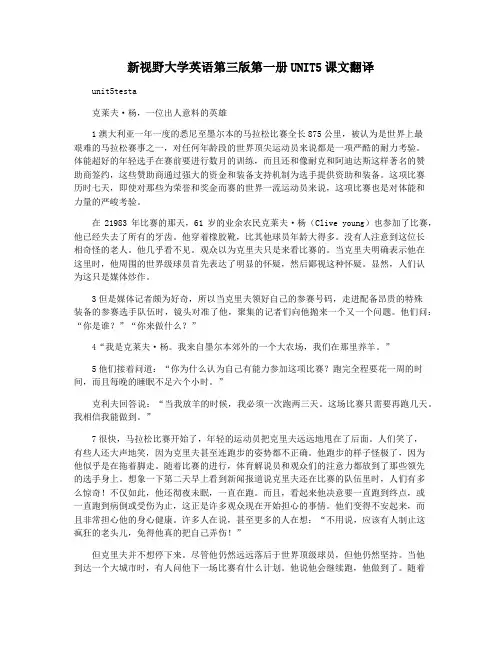
新视野大学英语第三版第一册UNIT5课文翻译unit5testa克莱夫·杨,一位出人意料的英雄1澳大利亚一年一度的悉尼至墨尔本的马拉松比赛全长875公里,被认为是世界上最艰难的马拉松赛事之一,对任何年龄段的世界顶尖运动员来说都是一项严酷的耐力考验。
体能超好的年轻选手在赛前要进行数月的训练,而且还和像耐克和阿迪达斯这样著名的赞助商签约,这些赞助商通过强大的资金和装备支持机制为选手提供资助和装备。
这项比赛历时七天,即使对那些为荣誉和奖金而赛的世界一流运动员来说,这项比赛也是对体能和力量的严峻考验。
在21983年比赛的那天,61岁的业余农民克莱夫·杨(Clive young)也参加了比赛,他已经失去了所有的牙齿。
他穿着橡胶靴,比其他球员年龄大得多。
没有人注意到这位长相奇怪的老人。
他几乎看不见。
观众以为克里夫只是来看比赛的。
当克里夫明确表示他在这里时,他周围的世界级球员首先表达了明显的怀疑,然后鄙视这种怀疑。
显然,人们认为这只是媒体炒作。
3但是媒体记者颇为好奇,所以当克里夫领好自己的参赛号码,走进配备昂贵的特殊装备的参赛选手队伍时,镜头对准了他,聚集的记者们向他抛来一个又一个问题。
他们问:“你是谁?”“你来做什么?”4“我是克莱夫·杨。
我来自墨尔本郊外的一个大农场,我们在那里养羊。
”5他们接着问道:“你为什么认为自己有能力参加这项比赛?跑完全程要花一周的时间,而且每晚的睡眠不足六个小时。
”克利夫回答说:“当我放羊的时候,我必须一次跑两三天。
这场比赛只需要再跑几天。
我相信我能做到。
”7很快,马拉松比赛开始了,年轻的运动员把克里夫远远地甩在了后面。
人们笑了,有些人还大声地笑,因为克里夫甚至连跑步的姿势都不正确。
他跑步的样子怪极了,因为他似乎是在拖着脚走。
随着比赛的进行,体育解说员和观众们的注意力都放到了那些领先的选手身上。
想象一下第二天早上看到新闻报道说克里夫还在比赛的队伍里时,人们有多么惊奇!不仅如此,他还彻夜未眠,一直在跑。
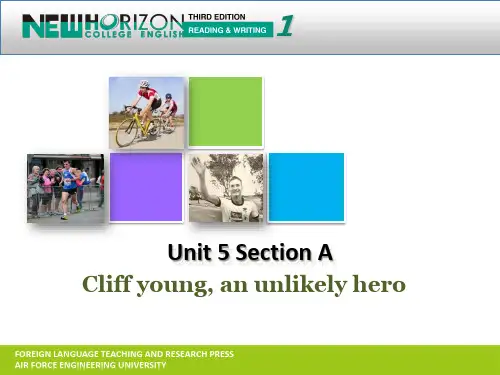
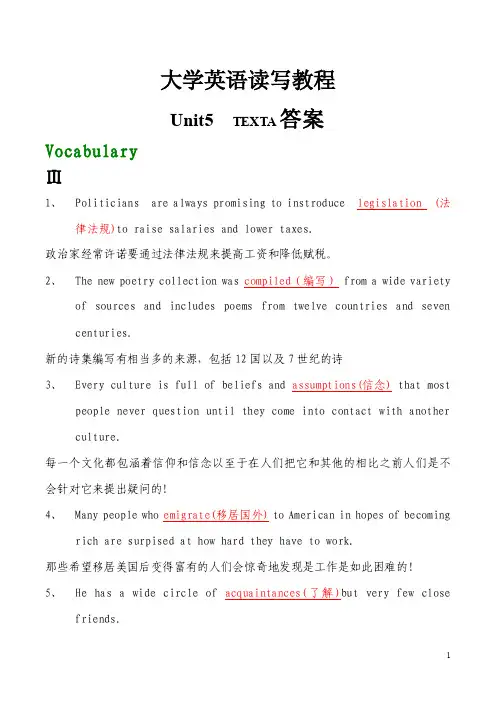
大学英语读写教程Unit5 TEXTA答案VocabularyⅢ1、Politicians are always promising to instroduce legislation (法律法规)to raise salaries and lower taxes.政治家经常许诺要通过法律法规来提高工资和降低赋税。
2、The new poetry collection was compiled(编写) from a wide varietyof sources and includes poems from twelve countries and seven centuries.新的诗集编写有相当多的来源,包括12国以及7世纪的诗3、Every culture is full of beliefs and assumptions(信念) that mostpeople never question until they come into contact with another culture.每一个文化都包涵着信仰和信念以至于在人们把它和其他的相比之前人们是不会针对它来提出疑问的!4、Many people who emigrate(移居国外)to American in hopes of becomingrich are surpised at how hard they have to work.那些希望移居美国后变得富有的人们会惊奇地发现是工作是如此困难的!5、He has a wide circle of acquaintances(了解)but very few closefriends.他有一班的熟人,但却少有知己。
6、She’s a renowed(有名的)tennis player,but she real ambition(雄心)is to become a wirter.虽然她是一位有名的网球运动员,但她真正想成为的是一名作家。
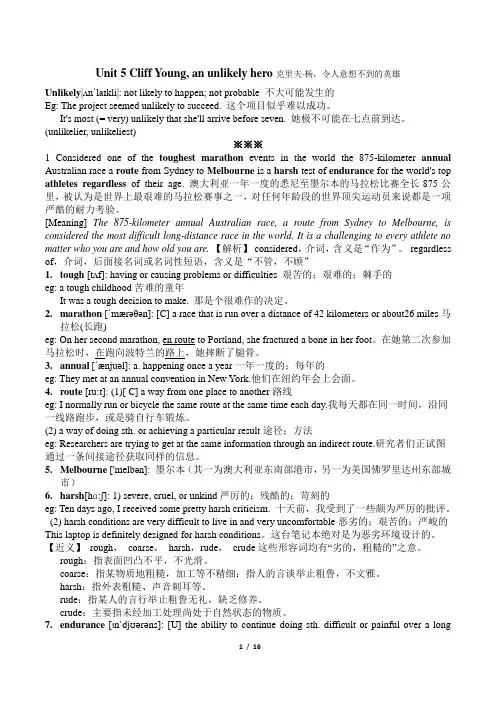
Unit 5 Cliff Y oung, an unlikely hero克里夫·杨,令人意想不到的英雄Unlikely|ʌnˈlaɪkli|:not likely to happen; not probable 不大可能发生的Eg: The project seemed unlikely to succeed.这个项目似乎难以成功。
It's most (= very) unlikely that she'll arrive before seven.她极不可能在七点前到达。
(unlikelier, unlikeliest)※※※1 Considered one of the toughest marathon events in the world the 875-kilometer annual Australian race a route from Sydney to Melbourne is a harsh test of endurance for the world's top athletes regardless of their age. 澳大利亚一年一度的悉尼至墨尔本的马拉松比赛全长875公里,被认为是世界上最艰难的马拉松赛事之一,对任何年龄段的世界顶尖运动员来说都是一项严酷的耐力考验。
[Meaning] The 875-kilometer annual Australian race, a route from Sydney to Melbourne, is considered the most difficult long-distance race in the world. It is a challenging to every athlete no matter who you are and how old you are.【解析】considered,介词,含义是“作为”。
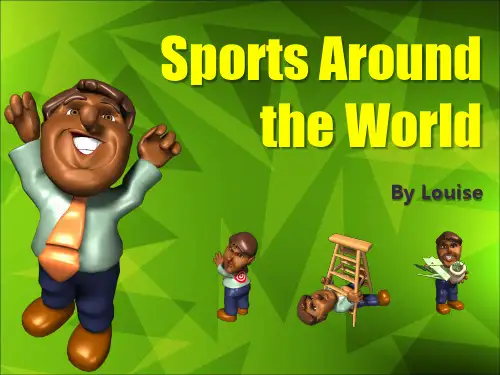

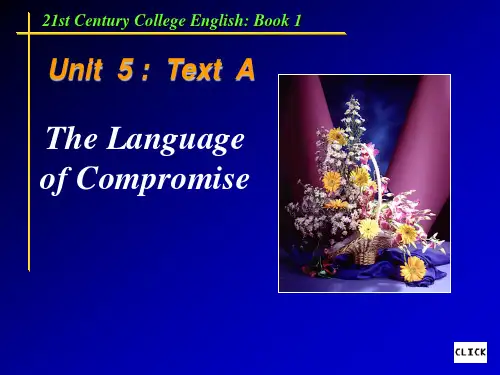
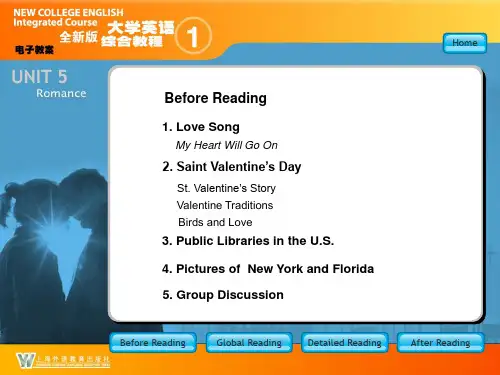

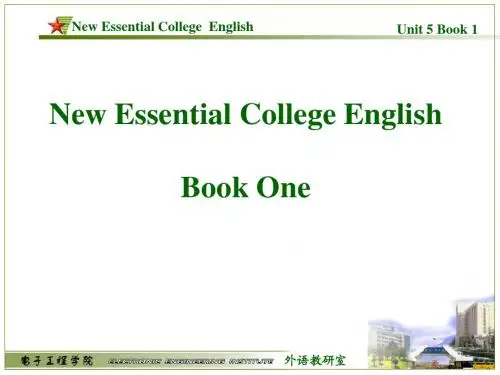

UNIT5TESTA克里夫·杨,令人意想不到的英雄1 澳大利亚一年一度的悉尼至墨尔本的马拉松比赛全长875 公里,被认为是世界上最艰难的马拉松赛事之一,对任何年龄段的世界顶尖运动员来说都是一项严酷的耐力考验。
体能超好的年轻选手在赛前要进行数月的训练,而且还和像耐克和阿迪达斯这样著名的赞助商签约,这些赞助商通过强大的资金和装备支持机制为选手提供资助和装备。
这项比赛历时七天,即使对那些为荣誉和奖金而赛的世界一流运动员来说,这项比赛也是对体能和力量的严峻考验。
2 1983年比赛那一天,克里夫·杨,一个牙齿已全部脱落的61 岁的农民业余选手也来参加比赛。
他脚穿橡胶靴,年龄也比其他选手大得多。
没有人注意到这个外表古怪的老头,他就跟个隐身人差不多。
聚集的人群以为克里夫只是来观看比赛的。
当克里夫明确表示自己是来参赛的时候,他周围的世界级选手先是表示出明显的怀疑,继而予以鄙视。
显然,人们认为这只是媒体的炒作而已。
3但是媒体记者颇为好奇,所以当克里夫领好自己的参赛号码,走进配备昂贵的特殊装备的参赛选手队伍时,镜头对准了他,聚集的记者们向他抛来一个又一个问题。
他们问:“你是谁?”“你来做什么?”4 “我是克里夫·杨。
我来自墨尔本郊外的一个大农场,我们在那里养羊。
”5 他们接着问道:“你为什么认为自己有能力参加这项比赛?跑完全程要花一周的时间,而且每晚的睡眠不足六个小时。
”6 克里夫回答道:“我放羊时每一次都要跑上两三天。
这项比赛只是需要再多花几天而已。
我相信我可以做到。
”7 很快,马拉松比赛开始了,年轻的运动员把克里夫远远地甩在了后面。
人们笑了,有些人还大声地笑,因为克里夫甚至连跑步的姿势都不正确。
他跑步的样子怪极了,因为他似乎是在拖着脚走。
随着比赛的进行,体育解说员和观众们的注意力都放到了那些领先的选手身上。
想象一下第二天早上看到新闻报道说克里夫还在比赛的队伍里时,人们有多么惊奇!不仅如此,他还彻夜未眠,一直在跑。
UNIT5TESTA克里夫杨,令人意想不到的英雄1澳大利亚一年一度的悉尼至墨尔本的马拉松比赛全长875公里,被认为是世界上最艰难的马拉松赛事之一,对任何年龄段的世界顶尖运动员来说都是一项严酷的耐力考验。
体能超好的年轻选手在赛前要进行数月的训练,而且还和像耐克和阿迪达斯这样著名的赞助商签约,这些赞助商通过强大的资金和装备支持机制为选手提供资助和装备。
这项比赛历时七天,即使对那些为荣誉和奖金而赛的世界一流运动员来说,这项比赛也是对体能和力量的严峻考验。
2 1983年比赛那一天,克里夫杨,一个牙齿已全部脱落的61岁的农民业余选手也来参加比赛。
他脚穿橡胶靴,年龄也比其他选手大得多。
没有人注意到这个外表古怪的老头,他就跟个隐身人差不多。
聚集的人群以为克里夫只是来观看比赛的。
当克里夫明确表示自己是来参赛的时候,他周围的世界级选手先是表示出明显的怀疑,继而予以鄙视。
显然,人们认为这只是媒体的炒作而已。
3但是媒体记者颇为好奇,所以当克里夫领好自己的参赛号码,走进配备昂贵的特殊装备的参赛选手队伍时,镜头对准了他,聚集的记者们向他抛来一个又一个问题。
他们问:你是谁?”你'来做什么?”4我是克里夫杨。
我来自墨尔本郊外的一个大农场,我们在那里养羊。
”5他们接着问道:你为什么认为自己有能力参加这项比赛?跑完全程要花一周的时间,而且每晚的睡眠不足六个小时。
”6克里夫回答道:我放羊时每一次都要跑上两三天。
这项比赛只是需要再多花几天而已。
我相信我可以做到。
”7很快,马拉松比赛开始了,年轻的运动员把克里夫远远地甩在了后面。
人们笑了,有些人还大声地笑,因为克里夫甚至连跑步的姿势都不正确。
他跑步的样子怪极了,因为他似乎是在拖着脚走。
随着比赛的进行,体育解说员和观众们的注意力都放到了那些领先的选手身上。
想象一下第二天早上看到新闻报道说克里夫还在比赛的队伍里时,人们有多么惊奇!不仅如此,他还彻夜未眠,一直在跑。
而且,看起来他决意要一直跑到终点,或一直跑到病倒或受伤为止,这正是许多观众现在开始担心的事情。
Unit 5Section A: A Dance with DadTeaching Objectives:1. 理解课文A 和B 的文章大意,了解人们如何通过舞蹈或对舞蹈艺术的追求来抒发对父母的感激之情。
2. 理解和正确运用重点词汇、短语、句型S+V+O 和if 条件句等。
3. 掌握中元音/Ã/ 和后元音/A:/ 的不同发音。
4. 正确区分现在分词和过去分词。
5. 了解中国传统“舞龙”的历史及象征意义。
Teaching Procedures:Part 1: Warm-up Activities1. Matching:Learn the following words and phrases about different types of dance, and match them to the pictures.2. Conversation: Listen to the conversation. Then practice with your partner, using the words and phrases provided on the right.Part 2: Text A: Fashion ForestⅠ. Background Information1. Beer Barrel Polka“Beer Barrel Polka”, also known as “The Barrel Polka and Roll Out the Barrel”, is a song which became popular worldwide during World War II. The music was composed by the Czech musician Jaromír Vejvoda in 1927. In June 1939, “Beer Barrel Polka”, as recorded by Will Glahé, was on the Hit Parade. During World War II, versions in many other languages were created and the song was popular among soldiers, regardless of their allegiances.Ⅱ. Words and phrases1. musclea. v. make one’s way by force 硬挤;费力前行He muscled his way into office. 他费力挤进了办公室。
21世纪大学英语应用型综合教程(修订版)1Unit 5 Part AText AA simpl e life well lived1 The businessman was at the pier of small coastal Mexican village when a small boat with just one fisherman d ocked. Insid e the small boat were several large yell ow fin tuna. The businessman complimented the Mexican on the quality of his fish and asked how l ong it took to catch them. The Mexican replied, “Only a little whil e”.2 The businessman then asked why he didn’t stay out l onger and catch more fish. The Mexican said he had enough to support his family’s immediate needs. The businessman then asked, “But what d o you d o with the rest of your time?” The Mexican fisherman said, “I sl eep late, fish a little, paly with ma children, take a nap with my wife, Maria, stroll into the village each evening where I sip wine and play the guitar with my amigos; I have a full and busy life, senor.”3 The businessman scoffed, “I am a Harvard MBA and I could help you. You shoul d spend more time fishing, and with the proceeds buy a bigger boat. With the proceeds from the bigger boat you could buy several boats; eventually you woul d have a fl eet of fishing boats. Instead of selling your catch to a mid dl eman, you woul d sell directly to the processor and eventually open your own cannery. You would control the product, processing and distribution. You woul d need to l eave this small coastal fishing village and move to Mexican City, then LA and eventually New York City where you would run your expanding enterprise.”4 The Mexican fisherman asked, “But senor, how l ong will this all take?” To which the businessman replied, “15-20 years”. “But what then, senor?” The businessman laughed and said, “That’s the best part! When the time is right you woul d announce an IPO and sell your company stock to the public and become very rich. You would make millions.” “Millions, senor? Then what?” The businessman said, “Then you woul d retire, move to a small coastal fishing village where you would sl eep late, fish a little, play with your kids, take a siesta with your wife, stroll to the village in the evenings where you could sip wine and play your guitar with your amigos.”5 The fisherman, still smiling, l ooked up and said, “Isn’t that what I’m d oing right now?”6 We live in a worl d in which being successful is everything. Success is measured by power, popularity, control, achievement, and winning. Having more and being more is success. The businessman measured success by the accumulation of wealth and by living an extravagant life. He hel d a Harvard MBA, millions of d ollars, and status as a powerful businessman. “The person with the most toys wins” is a fitting motto.7 Possessions and wealth are not enough. While comforting, wealth cannot fulfill. Benjamin Franklin was of the op inion, “Money never mad e a man happy y et, nor will it. The more a man has, the more he wants. Instead of filling a vacuum, it makes one.” Wealth may help us to escape emptiness for a short while; it cannot cure it.8 The businessman accumulated money to support his retirement. It was wise to plan for the future. Yet, what sort of life was he living in the present? The businessman was so future-oriented that he hadn’t taken sufficient time to question what the future l ooked like. The businessman was living for what the Mexican already enjoyed – a simple life well lived.9 Rudyard Kipling, giving a commencement ad dress at McGill University in Montreal, said there was one striking thing that d eserves to be remembered about peopl e. Warning the stud ents against an over-concern for money, power, or popularity, he said, “Someday you will meet a man who cares for none of these things. Then you will know how poor you are.” The businessman dis covered how poor he was when he met the Mexican fisherman.10 Ralph Wald o Emerson d efined succ ess in a simpl e life well lived as: “to laugh often and much; to win the respect of intelligent peopl e and affection of children; to earn the appreciation of honest critics and endure the betrayal of false friends; to appreciate beauty; to find the best in others; to l eave the worl d a litter bit better, whether by a healthy chil d, a gard en patch, or an improved social condition; to know even one life has breathed easier because you have lived. This is to have succeed ed.”11 I think the Mexican fisherman woul d have agreed with Emerson.(731 words) 一个简单的生活生活1商人是在一个小的沿海墨西哥村庄的码头时,一个小的船,只有一个渔夫停靠。